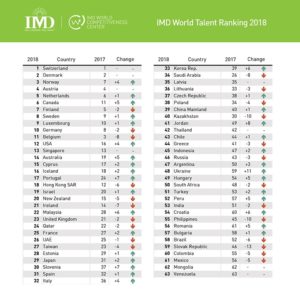The 2018 edition of one of the world’s foremost reports on the quality of international workforces has been released, with Western Europe dominating the top-10.
- IMD’s fifth edition of the World Talent Ranking (2018) assesses the extent to which countries develop, attract and retain talent to sustain the pool that enterprises employ to create long-term value
- Canada is the only non-European nation in the top-10
- The full ranking is available here
Lausanne, Switzerland, 19 November 2018 – Switzerland in first and Denmark in second, firmly lead the IMD World Talent Ranking 2018 for the fifth year in a row, followed by Norway, Austria and the Netherlands. Norway joins the top three, advancing four places up from last year, thanks to an improvement in public expenditure on education and the readiness of its talent pool. Canada (6th), Finland (7th), Sweden (8th), Luxembourg (9th), and Germany (10th) complete the top 10.
The Slovak Republic (59th), Colombia (60th), Mexico (61st), Mongolia (62nd), and Venezuela (63rd) are the last countries in the ranking.
“Since 2014, the Talent Ranking assesses how the 63 economies we study develop, attract and retain highly-skilled professionals. Cultivating a skilled and educated workforce is crucial to strengthening competitiveness and achieving long-term prosperity, particularly in the current dynamic landscape where artificial intelligence, robotics and other new technologies constantly redefine the challenges that governments, businesses and society in general will have to face in the future,” said Arturo Bris, Director of the IMD World Competitiveness Center. “This year the most successful countries in talent competitiveness are mainly European, mid-size economies. Moreover, these countries share high levels of investment in education and quality of life,” concludes Arturo Bris.
The IMD World Talent Ranking 2018, which has just been released from the Singapore edition of IMD’s signature program Orchestrating Winning Performance (OWP), evaluates the capability of 63 countries in developing, attracting and retaining talent. The assessment is based on three factors: Investment and Development, Appeal, and Readiness. These factors include indicators that capture the resources invested in developing local talent, the extent to which a country attracts and retains talent, and the quality of skills available in the talent pool.
Hard data and responses to the IMD Executive Opinion Survey are used to produce the ranking. The latter annual survey compiles input from over six thousand executives based in 63 different economies.

Western Europe leads, Eastern Europe lags, North America gives strong performance
This year, Switzerland once again confirms its role as an important global talent hub. It ranks 4th in Investment and Development, and 1st in both the Appeal and Readiness factors. In addition, several European countries fall within the 25 most competitive with respect to talent. Belgium (11th), Cyprus (15th), Portugal (17th), Ireland (21st), United Kingdom (23rd), and France (25th) complete this list.
With the exception of Estonia (28th), Slovenia (30th), and Latvia (33rd) Eastern European countries generally place in the lower part of the ranking. For instance, the Slovak Republic (59th), Bulgaria (57th), and Romania (56th) underperform in attracting highly skilled workers from abroad and they also face problems in retaining their locally-grown talent.
Canada (6th) is the only non-European country in the top ten, rising from 11th place, lifted by an improvement in the quality of its talent pool. The USA (12th) also moves up with respect to last year showing advancements in all three talent factors.
Singapore and Hong Kong SAR lead in Asia Pacific
In Asia, Singapore (13th), Hong Kong SAR (18th) and Malaysia (22nd) achieve the best placements in terms of talent competitiveness. While the two city-states continue to excel in tapping into the international talent pool, Malaysia instead focuses on investments in education to develop its homegrown skilled workforce. Taiwan (27th) prioritizes the attraction and retention of talent, Japan improves (29th) due to the availability of skilled labor and the effectiveness of its education system and South Korea advances (33rd) partly due to increased government expenditure on education and improvements in the implementation of apprenticeships programs and employee training. China (39th) places in the second half of the ranking, because of its difficulties in attracting foreign skilled workers paired with a level of public expenditure in education that remains below the average of other advanced economies. Kazakhstan (40th) and Thailand (42nd) also fall in the second half of the ranking, partly due to their performance in the readiness of domestic talent.
In the Pacific area, Australia (14th) and New Zealand (20th) confirm their role as talent-appealing hubs. Both countries show high levels of readiness in their talent pool and offer attractive quality of life for international professionals.
Latin America struggles
At the bottom of the ranking are several Latin American countries. These economies are struggling in developing and retaining talent. Venezuela (63rd), Mexico (61st), Colombia (60th) and Brazil (58th) all share issues related to brain drain matched by a relatively low level of investments in education.
- Learn more about the IMD World Competitiveness Center
- Discover our World Competitiveness Ranking, and Digital Competitiveness Ranking.
- Follow us on Twitter
- Follow us on Facebook
- Follow our Instagram
- Connect with us on LinkedIn
